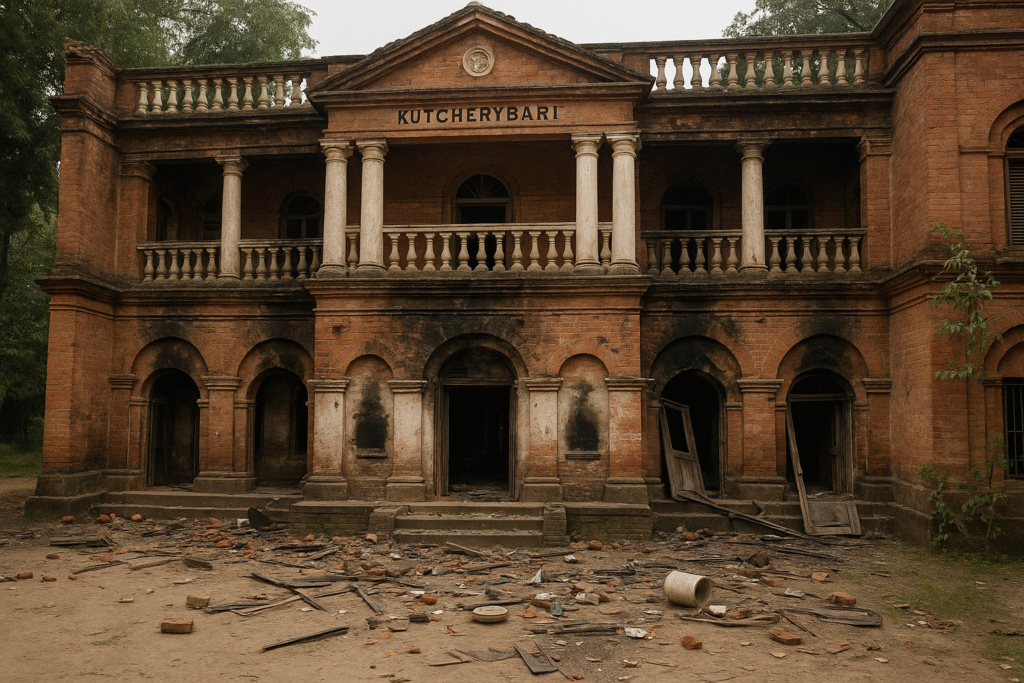A Grave Cultural Insult Ignites Diplomatic Tensions
In a deeply unsettling incident that has sparked outrage across India, the ancestral home of Rabindranath Tagore in Bangladesh was vandalised, triggering a strong diplomatic response from New Delhi. The attack, perceived not only as an act of cultural desecration but also as a provocative gesture by extremist elements, has intensified demands from India for Bangladesh to clamp down on terrorist activities operating within its borders.

India, home to the revered Nobel laureate Tagore, sees this incident as a direct attack on shared heritage and historical legacy, straining the long-standing cultural bonds between the two nations. The call for justice and accountability is now louder than ever.
Rabindranath Tagore, the first non-European to win the Nobel Prize in Literature, holds a revered place in the hearts of both Indians and Bangladeshis. His contribution to literature, art, and music transcends national boundaries. In fact, both India and Bangladesh adopted his songs as their national anthems — “Jana Gana Mana” and “Amar Shonar Bangla,” respectively.
His ancestral home in Kushtia, Bangladesh — a historically rich site where Tagore spent several years — is a beacon of cultural history and harmony. The vandalisation of this heritage site is not just a matter of property damage. It is seen as a spiritual and intellectual attack on the essence of Indo-Bangla unity.
The Attack and Its Aftermath: What Happened?
According to reports, unidentified miscreants broke into Tagore’s ancestral home, damaging the premises and leaving behind signs of deliberate destruction. This act of violence is believed to have been orchestrated by extremist groups operating with impunity in the region.
India has since lodged a formal diplomatic protest, pressing Bangladesh for a swift investigation and the immediate arrest of those responsible. The Ministry of External Affairs stated firmly that the safety of shared cultural monuments must be a priority and demanded that Bangladesh demonstrate zero tolerance toward extremism.
India’s Diplomatic Stand: No Room for Extremism
India’s response has been stern and unwavering. The Indian government has urged Bangladesh to identify and dismantle networks of radical groups responsible for sowing unrest and religious intolerance. In a strongly worded statement, Indian diplomats emphasized the importance of preserving sites of historical importance and protecting them from ideological vandalism.
The incident, officials say, is not an isolated act but part of a growing pattern of extremist aggression that undermines regional peace and mutual respect. India has made it clear that continued negligence in addressing such threats could negatively impact bilateral relations.
Cultural Heritage Under Threat: The Bigger Picture
This attack is not just about a building — it’s about a movement to erode the cultural and intellectual foundations that have long connected India and Bangladesh. The targeted destruction of a site linked to Tagore reveals an underlying attempt to rewrite historical narratives and suppress pluralistic values.
The desecration of Tagore’s home is reminiscent of other global patterns where cultural heritage becomes collateral in ideological conflicts. UNESCO has often highlighted the vulnerability of cultural monuments in volatile regions, and this incident fits that unfortunate trend.
Public Outcry and Intellectual Voices Demand Justice
The reaction in India has been swift and emotional. Writers, artists, historians, and civil society leaders have condemned the incident, calling it an “affront to the soul of the subcontinent.” Vigils and solidarity events have been held in Kolkata and New Delhi, with cultural organizations urging for regional cooperation to protect shared heritage.
Indian universities and literary forums have issued statements urging the Bangladeshi government to uphold its commitment to cultural protection and pluralism. Social media has been flooded with hashtags like #JusticeForTagore and #ProtectHeritage, trending across India and parts of Bangladesh.
Bangladesh Government Responds: Promises but Rising Skepticism
In response to India’s concerns, Bangladesh authorities have assured a thorough investigation and have vowed to bring the culprits to justice. However, skepticism remains high given past instances where similar promises yielded little progress.
The Indian government is watching closely, expecting not just words but visible actions. Security for other cultural sites in Bangladesh has also been called into question, and India is expected to push for collaborative measures to preserve historical landmarks.
Regional Stability at Stake: The Need for Proactive Measures
This incident could become a tipping point in Indo-Bangladesh relations if not handled appropriately. While both nations have enjoyed cooperation in trade, connectivity, and cultural exchange, the rise of extremist elements can quickly undo decades of diplomatic goodwill.
India is likely to seek stronger security assurances and joint counter-terrorism initiatives to ensure such acts are not repeated. The ball is now in Bangladesh’s court to demonstrate a genuine commitment to maintaining regional harmony.
Call for Global Awareness and Cultural Responsibility
The international community must take note. Cultural heritage is a global responsibility, and any attack on such monuments should be condemned universally. This isn’t just about India and Bangladesh — it is about upholding the collective memory and shared values of human civilization.
Cultural landmarks like Tagore’s ancestral home are irreplaceable. They represent the conscience of a people and the spirit of a time, and their protection is crucial in the fight against the forces of ignorance and intolerance.
Conclusion: Justice, Accountability, and Renewed Vigilance
India’s demand is not merely political — it is moral. The protection of cultural heritage is non-negotiable. We stand with the people of Bangladesh who cherish Tagore’s legacy and call upon their government to ensure justice is not delayed or diluted.
This tragic incident should become a catalyst for stronger cultural and security cooperation, not a cause for division. Let us hope that from this darkness emerges a renewed commitment to the values that Rabindranath Tagore so eloquently championed — peace, unity, and human dignity.











